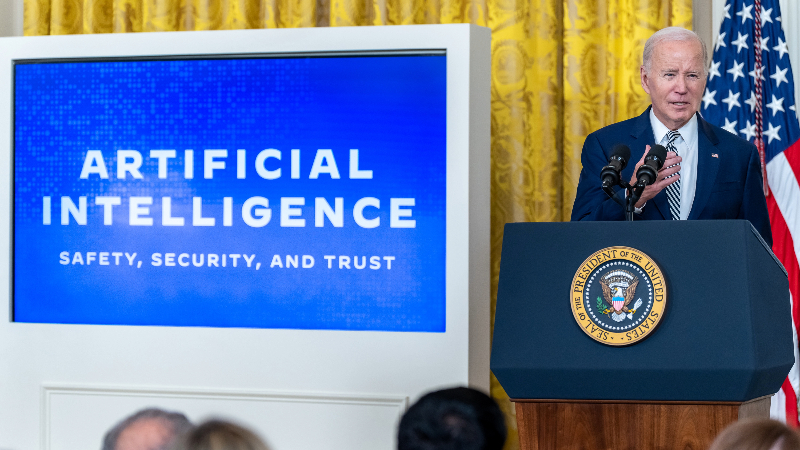
Following President Biden’s signing Monday afternoon of his landmark executive order (EO) on Safe, Secure, and Trustworthy Artificial Intelligence, key lawmakers pointed to the pressing need for legislative action to cement in place major tenets of the order for the longer term.
The EO establishes new standards for AI in eight categories including: safety and security; privacy; equity and civil rights; supporting consumers and workers; innovation and competition; American leadership; and government use of AI. The order also issues major policy marching orders to no less than seven Federal agencies for specific follow-up work.
But most importantly for the longer term, the order also calls on Congress to approve legislation on data privacy and other AI-related topics. White House executive orders can have a relatively short shelf-life; they carry the force of the law for as long as the incumbent remains in office but can be cancelled by the stroke of a pen by a successor.
“This order builds on the critical steps we’ve already taken – to ensuring the AI Bill of Rights to bringing together leading AI companies who agreed to voluntarily make certain commitments to make sure AI is safe and the systems secure,” President Biden said during the EO launch event at the White House Monday. “With today’s executive order I’ll soon be signing, I’m determined to do everything in my power to promote and demand responsible innovation.”
As part of that pledge, President Biden also called on Congress to do their part to further the order’s goals.
“Let me be clear, this executive order represents bold action, but we still need Congress to act,” President Biden said. “We’re going to continue to call on Congress to pass bipartisan legislation to stop big tech from collecting personal data on our kids and teenagers online.”
“We face a genuine inflection point in history. One of those moments where the decisions we make in the very near term are going to set the course for the next decades,” President Biden said. “There’s no greater change I can think of in my life than AI presents as a potential: exploring the universe, fighting climate change, ending cancer as we know it, and so much more.”
Senate Majority Leader Chuck Schumer, D-N.Y., who has been convening AI forum events in the Senate to prepare lawmakers for possible legislation, said the Senate is gearing up take action.
“President Biden took a crucial step with his artificial intelligence executive order to ensure that the U.S. remains the leader of AI innovation and can harness this awesome technology for good,” Sen. Schumer said.
“This is a massive step forward, but of course more is needed,” he said. “All executive orders are limited in what they can do, so it is now on Congress to augment, expand, and cement this massive start with legislation. The Senate will continue to work in bipartisan fashion, in conjunction with the President and his Administration, to build upon this momentum.”
“Congress must now act with urgency and humility,” Sen. Schumer said. “Urgency, because we can’t wait while other countries are gaining on us and humility because the task of ensuring sustained investment to advance AI innovation and setting common-sense guardrails is a powerful and challenging one.”
“I look forward to building upon today’s important executive order and continuing to drive towards legislative action on AI,” he pledged. “We cannot afford to wait.”
Rep. Don Beyer, D-Va., vice-chair of the bipartisan Congressional AI Caucus, welcomed President Biden’s landmark EO, and also pointed to the need for action by Congress to cement AI policy into place for the longer term.
“President Biden’s Executive Order on AI is an ambitiously comprehensive strategy for responsible innovation that builds on previous efforts,” said Rep. Beyer. “We know, however, that there are limits to what the Executive Branch can do on its own and in the long term, it is necessary for Congress to step up and legislate strong standards for equity, bias, risk management, and consumer protection.”
Rep. Gerry Connolly, D-Va., ranking member of the House Subcommittee on Cybersecurity, Information Technology, and Government Innovation, acknowledged that the Federal government must be a partner in overseeing the deployment of new technologies, and indicated his office stands ready to help drive the order’s aims forward.
“I have advocated for AI principles that intentionally balance innovation, consumer safety, cybersecurity, and equity. I look forward to working with the Biden-Harris Administration to ensure the federal government lives up to those goals,” Rep. Connolly said.
Following the order’s signing on Monday, Vice President Harris is traveling to the United Kingdom to highlight America’s vision for the future of AI globally. The UK AI Summit is the first of its kind, forging leaders from around the world together in London – including China.
“We intend that the actions we are taking domestically will serve as a model for international action – understanding that AI developed in one nation can impact the lives and livelihoods of billions of people around the world,” the vice president said ahead of Biden signing the EO. “Fundamentally, it is our belief that technology with global impact requires global action.”
“Let us be clear, when it comes to AI, America is a global leader,” she continued, adding, “It is American companies that lead the world in AI innovation. It is America that can catalyze global action and build global consensus in a way that no other country can.”
